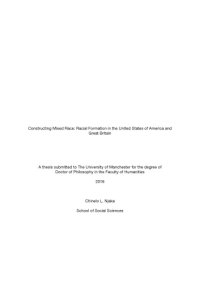
Ebook: Constructing Mixed Race: Racial Formation in the United States of America and Great Britain
Author: Chinelo L. Njaka
- Tags: thesis
- Year: 2017
- Publisher: University of Manchester
- Language: English
- pdf
The aim of the thesis is to examine contemporary constructions of mixed race in the United States and Britain through the examination of two types of racial projects: the national census and voluntary and community organisations focused on mixed race. Using a combination of critical discourse analysis and qualitative interviews, the research analyses the ways in which mixed race is being described, conceptualised, and constructed through macro- and meso-level racial projects in each nation, in order to compare the racial formation processes that are occurring in the early twenty-first century's "mixed race moment."The thesis builds upon racial formation theory, which argues that the concept of "race" is never fully fixed, but rather is made through socio-historical processes that create, inhabit, transform, and destroy racialised notions over time and context (Omi and Winant 1986, 1994, 2015). The theory examines the struggles over racialised meanings that occur between macro-level and micro-level racial projects. This thesis aims to fill the gap left by this focus through examining racial projects that occupy the socio-political "middle ground" between macro- and micro-level projects: the "meso-level."The research examines the ways in which the state constructs mixed race in the United States and Britain. Each nation's census allowed for mixed race self identification in 2000 and 2001, respectively. The thesis examines the social, historical, and political processes that led to mixed race options at that particular time. It argues that the ways in which the census organisations report upon mixed race functions as a discursive practice that provides an official construction of mixed race through simultaneously reflecting and shaping racialised descriptions and narratives within each nation.The thesis examines the usefulness of "meso-level" projects by exploring the role of mixed race organisations in racial formation processes through the examination of six meso-level mechanisms of racialisation: social identity, social capital, collective action, idioculture, extended networks, and civil society (Fine 2012). Incorporating Michel Foucault's notion of "governmentality" (Gordon 1991), the thesis highlights the ways that mixed race organisations have interacted directly and indirectly with macro-level bodies during and after the addition of the mixed race census options as well as other routes of interaction specific to each national context. The thesis argues that the racialisation that occurs at the macro-level holds a "default" role with which mixed race organisations then engage. This highlights the relative roles of power the institutions have in each national context and the ways they are managed through relations fostered through governmentality. The thesis also examines the discourses used by mixed race organisations in the US and Britain as meso-level racial projects and poses the argument that the varied usage of multiple racialised paradigms leads to an increased relative fluidity in the constructions of mixed race than their respective macro-level projects.The systematic cross-national comparison of the ways mixed race is constructed in the US and Britain highlights the ways in which both macro-level and meso-level organisations articulate and promote racialised ideology through their relative levels of power in society. By analysing and comparing these racial projects and their interactions, the paradigms and discourses used reveal the particularities and overlaps by these organisations as they contest, negotiate, and accept formations of mixed race.
Download the book Constructing Mixed Race: Racial Formation in the United States of America and Great Britain for free or read online
Continue reading on any device:

Last viewed books
Related books
{related-news}
Comments (0)